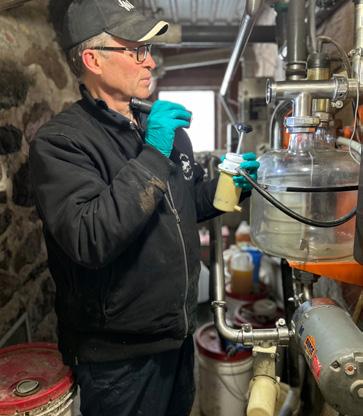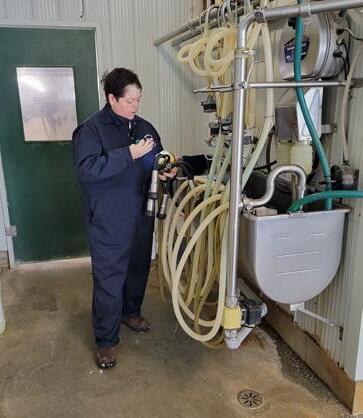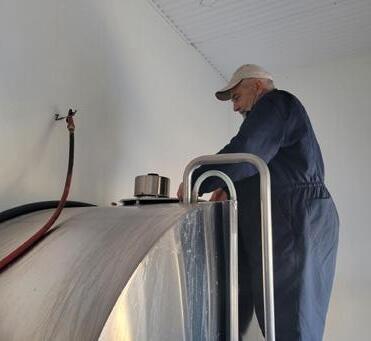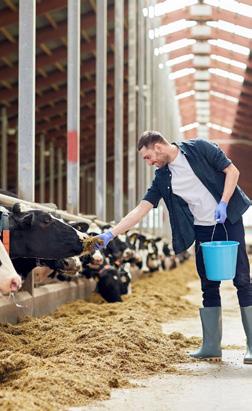
6 minute read
FROM THE FRONT LINES
By Jeanine Moyer
AS DFO’S FRONT LINE when it comes to producer relations and all things affecting milk quality, Field Services Representatives (FSRs) are on farm every day to support producers while ensuring uncompromising commitment to the production of high-quality milk. Dairy Farmers of Ontario’s (DFO) FSRs are a mighty force across Ontario, providing resources, solutions and guidance to Ontario dairy farmers. Responsible for administering the Raw Milk Quality Program through on-farm inspections, FSRs conduct rigorous inspections on every dairy farm in the province, working proactively with farmers to achieve and maintain Grade A farm status. Whether they’re veterans or new additions to quality assurance in the dairy sector, each FSR brings extensive experience and purpose to their work. They’re a critical piece of the equation and the reason we say Ontario meets some of the highest quality standards in the world. Meet three of them who are making a difference.
Paul Norris
ZONE L
Counties: Waterloo, Wellington, Oxford
Paul Norris says every aspect of his job supports the quality of Ontario milk.
Bringing more than 30 years of professional experience to his role as FSR, he is the primary contact for 305 Ontario dairy producers in Waterloo, Wellington and Oxford counties. Norris worked in an industry milk quality role for more than a decade before joining DFO’s FSR team 23 years ago.

While his role includes many technical responsibilities, like conducting Raw Milk Quality Program Grade A inspections and troubleshooting milk quality problems on the farm, much of his time is spent working alongside farmers, helping them take a practical, proactive approach to quality milk production. He attributes his focus on maintaining and improving milk quality to impactful mentors early in his career.
“There’s a significant level of trust built between a farmer and their FSR,” says Norris. “While the inspections are an important part of the job, I’m not just looking for problems, I’m looking for ways to improve production, animal care and the quality of milk on each farm.”
From answering questions about programs and policies, to troubleshooting concerns and providing another set of eyes or perspective for farmers, Norris supports the day-to-day production of milk. Through a hands-on approach and the backing of a team of fellow FSRs, he’s able to bring experiences gleaned from other farms across the province to farmers in his zone, helping them proactively address concerns before they arise.
Norris is also responsible for helping farmers meet and maintain their Grade A status. He calls himself a hands-on problem solver at heart and says his favourite thing to do is dismantle milking and cooling equipment to ensure cleanliness and proper functionality. And while he’s there, he’s also preemptively looking for any problems that could cause the farm to see high test counts or quality concerns.
“I’m also trying to prevent unnecessary stress to our farmers while helping them meet requirements.”
Norris says he feels fortunate to work as an FSR every day. “I couldn’t be prouder to work hand in hand with producers to grow our market and provide safe, quality milk to consumers.”
BETTY-ANNE ELLIOTT ZONE M
Counties: Bruce, Huron
For Betty-Anne Elliott, the most gratifying part of her job is seeing Ontario dairy farmers succeed.
Working as an on-farm advisor for nearly 40 years, she has built lasting relationships with farmers throughout her zone.
“Relationships are a big part of my job. I aim to build trust and respect with every farm visit,” says Elliott, adding that while an important part of her FSR role is regulatory, ensuring farmers follow the Milk Act, maintain Grade A status, care for their animals, and produce quality milk, her job extends far beyond programs and policies. Her goal is to be the first call farmers make when they have a problem or want to share a win.
Now, working with the second generation of many farms in her region, Elliott says it’s an energizing experience contributing to the success of both the farm and farming families.
As an FSR, Elliott conducts unannounced farm visits to each dairy farm in her area every two years, and helping the farms achieve and maintain their Grade A status is always her goal. With a careful eye, she evaluates, watching for opportunities for farms to improve their quality and avoid unexpected issues. Most producers appreciate her proactive approach, third-party perspective and helpful ideas she shares.
Elliott is responsible for 276 farms and is most proud working alongside a farmer to solve a challenge or quality issue.
“I’m able to see unique solutions to challenges or ideas to improve efficiencies or animal care that most farmers don’t get a chance to see because I visit so many farms,” she explains. “I can share these experiences and suggestions from farm to farm to help everyone improve.”
Another important part of Elliott’s role is support. She’s the first call when farmers need help understanding policies or programs, if they’re having a problem, or in times of crisis, like a barn fire.
“We’re all human and having a voice on the other end of the phone can go a long way to support individual farmers and our overall industry,” she says.
Through experience working as part of OMAFRA’s Raw Milk Quality Program and nearly 25 years in her FSR role, Elliott has seen a lot of changes to regulations and requirements and says part of every FSR’s job is to understand policies and regulations so they can explain how they impact Ontario farmers and why they are important.
“I like to think of myself as a champion for change, innovation and improvement on Ontario dairy farms,” says Elliott.
JEAN-GUY SEGUIN
ZONE C
Counties: Algoma, Cochrane, East-Nipissing-Parry Sound, East Sudbury-West Nipissing, Manitoulin-West Sudbury, Rainy River, Temiskaming, and Thunder Bay
As a former dairy farmer, Jean-Guy Seguin brings hands-on experience to his FSR role.

Though he retired from dairy farming in 2006, Seguin draws on his experience daily when covering the largest field service zone in the province, with 104 dairy farms spread across northern Ontario.
And with eight years of service as a DFO board member and six years on the Dairy Farmers of Canada board, Seguin also brings a deep understanding of industry relations to his job.
Regular Grade A inspections are always performed in person but Seguin doesn’t hesitate to employ technology to further support producers spread over the vast geography of his region.
“I regularly have farmers take apart equipment to troubleshoot concerns during a live video call,” he says.
Seguin also works closely with other service providers for support when needed.
Farm Inspections
Under the Raw Milk Quality Program, every dairy farm in Ontario must meet Grade A inspection requirements. DFO’s field service representatives administer the program and, among other things, look at:

Animal care – animals must be cared for in accordance with the Code of Practice for the Care and Handling of Dairy Cattle. A Cattle Health and Veterinary Medicine Use Declaration, signed by the herd’s veterinarian and the producer, must be on file.
Biosecurity risks – contaminants which could affect animal health or milk quality must be kept separate from animals, equipment and areas, milkhouse entrance area, laneway and loading area.

Milk contact surfaces – all surfaces must be clean and in good repair.
Milk storage and cooling – bulk tank interior and exterior must be clean and in good repair. Milk must be cooled to 10 C or lower within one hour after milking and to between 1 and 4 C within two hours of the end of milking. Milk must be stored between 1 and 4 C.
Time-temperature recorder (TTR) – must be properly functioning and constantly monitoring milk temperature and milking equipment wash time and temperatures.
Udder contact surfaces – stalls, alleyways, barnyard, pasture, etc., must be clean.
Physical structures – animal housing, milking areas and milkhouse must be clean, tidy and maintained.
“We have a robust network of dairy industry representatives we all rely on for support,” says Seguin. “We’re all connected and are proud to work together to deliver quality milk.”
He begins every day reviewing milk test results and talking to farmers about a variety of topics including, “milk quality concerns, explaining DFO policies, and sharing general experiences to help a farmer overcome a challenge.”
A certified Bulk Tank Milk Grader (BTMG) himself, Seguin also supports the recertification and verification process for northern Ontario drivers. He delivers BTMG renewal certification exams, renews grading skills every five years and conducts annual truck inspections. Between 12 and 20 BTMGs support northern Ontario.
Seguin says the opportunity learn is one of the best parts of his job. “While my role is to advise farmers on maintaining and improving milk quality and animal care, I enjoy learning from each experience, too. I also have the ability to share what we all learn together with fellow dairy farmers across the region.”
Sharing his knowledge and experience with new dairy farmers is also important to Seguin who enjoys working alongside New Entrant Quota Assistance Program participants.
“My FSR role is to share knowledge and experience and they welcome any advice offered,” he says. “It’s so enjoyable to share moments of success with farmers new to the dairy industry.”
We’re FCC, the only lender 100% invested in Canadian agriculture and food, serving diverse people, projects and passions with financing and knowledge.
Let’s talk about what’s next for your operation.






